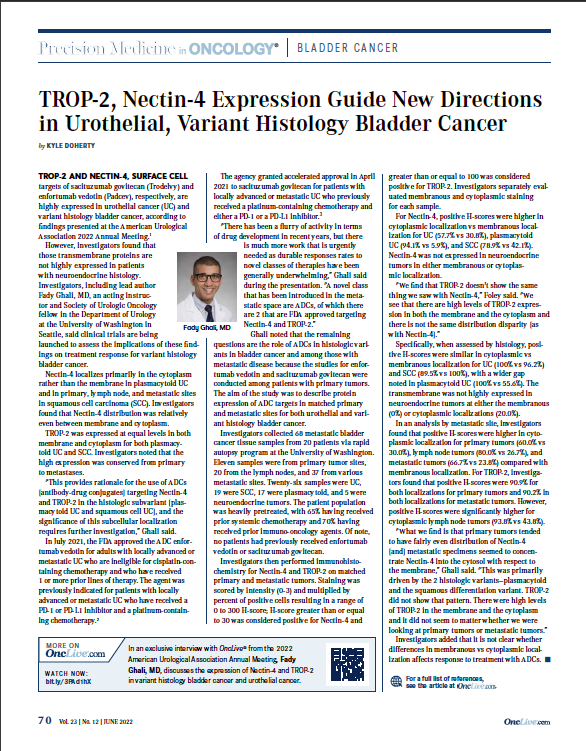
- Vol. 23/No. 12
- Volume 23
- Issue 12
Precision Medicine in Oncology®: TROP-2, Nectin-4 Are Highly Expressed in Urothelial, Variant Histology Bladder Cancer
TROP-2 and Nectin-4, surface cell targets of sacituzumab govitecan and enfortumab vedotin, respectively, are highly expressed in urothelial cancer and variant histology bladder cancer.
TROP-2 and Nectin-4, surface cell targets of sacituzumab govitecan (Trodelvy) and enfortumab vedotin (Padcev), respectively, are highly expressed in urothelial cancer (UC) and variant histology bladder cancer, according to findings presented at the 2022 American Urological Association Annual Meeting.1
However, investigators found that those transmembranes are not highly expressed in patients with neuroendocrine histology. Investigators, including lead author Fady Ghali, MD, an acting instructor and Society of Urologic Oncology fellow at the University of Washington Department of Urology in Seattle, say they are launching clinical trials to assess the implications of these findings on treatment response for variant histology bladder cancer.
Nectin-4 localized primarily in the cytoplasm rather than the membrane in plasmacytoid UC and squamous cell carcinoma (SCC) in primary, lymph node, and metastatic sites. Investigators found that Nectin-4 distribution was relatively even between membrane and cytoplasm.
TROP-2 was expressed at equal levels in both membrane and cytoplasm for both plasmacytoid UC and SCC. Investigators added the high expression was conserved from primary to metastases.
In July 2021, the FDA approved enfortumab vedotin for adults with locally advanced or metastatic UC who are ineligible for cisplatin-containing chemotherapy and who have received 1 or more prior lines of therapy. The agent was previously indicated for patients with locally advanced or metastatic UC who have received a PD-1 or PD-L1 inhibitor and a platinum-containing chemotherapy.2
The agency granted accelerated approval to sacituzumab govitecan for patients with locally advanced or metastatic UC who previously received a platinum-containing chemotherapy and either a PD-1 or a PD-L1 inhibitor in April 2021.3
Fady et al noted that the role of these novel humanized monoclonal antibody-drug conjugates (ADCs) in the treatment of variant histology bladder cancer is unknown. They designed this study to better understand how these agents affect the disease at both primary and metastatic sites.
Investigators collected 68 metastatic bladder cancer tissue samples from 20 total patients. Twenty-seven samples were UC, 19 were SCC, 17 were plasmacytoid, and 5 were neuroendocrine. They then performed immunohistochemistry for Nectin-4 and TROP-2 on matched primary and metastatic tumors. Staining was scored by intensity (0-3) and multiplied by percent of positive cells resulting in a range of 0 to 300 H-score; H-score greater than or equal to 30% was considered positive for Nectin-4 and greater than or equal to 100 was considered positive for TROP-2. Investigators separately evaluated membranous and cytoplasmic staining for each sample.
Investigators collected 11 samples from primary tumor sites, 20 from the lymph nodes, and 37 from various metastatic sites. Seventeen (85%) patients previously received systemic chemotherapy and 35% had received immunotherapy. No patient had received enfortumab vedotin or sacituzumab govitecan.
For Nectin-4, investigators found that positive H scores were higher in cytoplasmic localization for primary tumors (60.0% vs 30.0%), lymph node tumors (80.0% vs 26.7%), and metastatic tumors (66.7% vs 23.8%) compared with membranous localization. When assessed by histology, positive H scores were higher in cytoplasmic localization vs membranous localization for UC (57.7% vs 30.8%), plasmacytoid UC (94.1% vs 5.9%), and SCC (78.9% vs 42.1%). Nectin-4 was not expressed in neuroendocrine tumors in either membranous (0%) or cytoplasmic (0%) localization.
For TROP-2, investigators found that positive H scores were 90.9% for both localizations for primary tumors and 90.2% in both localizations for metastatic tumors. However, positive H score was significantly higher for cytoplasmic lymph node tumors (93.8% vs 43.8%).
When assessed by histology, positive H scores favored cytoplasmic localization for UC (100% vs 96.2%) and plasmacytoid UC (100% vs 55.6%) but favored membranous localization in SCC (100% vs 89.5%). Again, the transmembrane was not highly expressed in neuroendocrine tumors at either the membranous (0%) or cytoplasmic localizations (20.0%).
Investigators added that it is not clear whether differences in membranous vs cytoplasmic localization affects response to treatment with ADCs.
References
- Ghali, F, Roudier M, Vakar-Lopez F, et al. Antibody drug conjugates and variant histology muscle-invasive bladder cancer: are the targets present in primary and/or metastatic tumors? J Urol. 2022;207(suppl 5):e913. doi:10.1097/JU.0000000000002630.09
- FDA grants regular approval to enfortumab vedotin-ejfv for locally advanced or metastatic urothelial cancer. News release. July 9, 2021. Accessed May 16, 2022. https://bit.ly/3lfWa5Y
- FDA grants accelerated approval to sacituzumab govitecan for advanced urothelial cancer. News release. April 13, 2021. Accessed May 16, 2022. https://bit.ly/38AQaSq
Articles in this issue
over 3 years ago
Radioligand Therapy Boosts Survival in mCRPCover 3 years ago
A Molecular Revolution Is Underway in Thoracic Oncologyover 3 years ago
Markman Highlights Key Areas of Investigation in Oncology






































